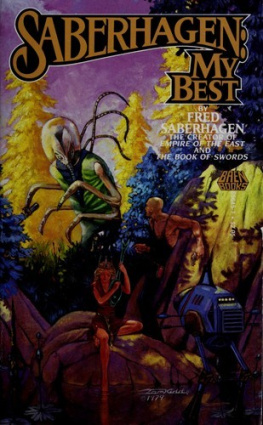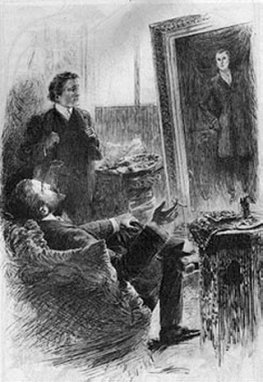ADVENTURE OF THE METAL MURDERER
By Fred Saberhagen
It had the shape of a man, the brain of an electronic devil. It and the machines like it were the best imitations of men and women that the berserkers, murderous machines themselves, were able to devise and build. Still, they could be seen as obvious frauds when closely inspected by any humans.
"Only twenty-nine accounted for?" the supervisor of Defense demanded sharply. Strapped into his combat chair, he was gazing intently through the semitransparent information screen before him, into space. The nearby bulk of Earth was armored in the dun-brown of defensive force fields, the normal colors of land and water and air invisible.
"Only twenty-nine." The answer arrived on the flagship's bridge amid a sharp sputtering of electrical noise. The tortured voice continued, "And it's quite certain now that there were thirty to begin with."
"Then where's the other one?"
There was no reply.
All of Earth's defensive forces were still on full alert,
though the attack had been tiny, no more than an attempt
at infiltration, and seemed to have been thoroughly. repelled. Berserkers, remnants of an ancient interstellar war, were mortal enemies of everything that lived and the greatest danger to humanity that the universe had yet revealed.
A small blur leaped over Earth's dun-brown limb, hurtling along on a course that would bring it within a few hundred kilometers of the supervisor's craft. This was Power Station One, a tamed black hole. In time of peace the power-hungry billions on the planet drew from it half their needed energy. Station One was visible to the eye only as a slight, flowing distortion of the stars beyond.
Another report was coming in. "We are searching space for the missing berserker android, Supervisor."
"You had damned well better be."
"The infiltrating enemy craft had padded containers for thirty androids, as shown by computer analysis of its debris. We must assume that all containers were filled."
Life and death were in the supervisor's tones. "Is there any possibility that the missing unit got past you to the surface?"
"Negative, Supervisor." There was a slight pause. "At least we know it did not reach the surface in our time."
"Our time? What does that mean, babbler? How could...ah."
The black hole flashed by. Not really tamed, though that was a reassuring word, and humans applied it frequently. Just harnessed, more or less.
Suppose-and, given the location of the skirmish, the supposition was not unlikely-that berserker android number thirty had been propelled, by some accident of
combat, directly at Station One. It could easily have entered the black hole. According to the latest theories, it might conceivably have survived to reemerge intact- into the universe, projected out of the hole as its own tangible image in a burst of virtual-particle radiation.
Theory dictated that in such a case the reemergence must take place before the falling in. The supervisor crisply issued orders. At once his computers on the world below, the Earth Defense Conglomerate, took up the problem, giving it highest priority. What could one berserker android do to Earth? Probably not much. But to the supervisor, and to those who worked for him, defense was a sacred task. The temple of Earth's safety had been horribly profaned.
To produce the first answers took the machines eleven minutes.
"Number thirty did go into the black hole, sir. Neither we nor the enemy could very well have foreseen such a result, but-"
"What is the probability that the android emerged intact?"
"Because of the peculiar angle at which it entered, approximately sixty-nine percent."
"That high!"
"And there is a forty-nine-percent chance that it will reach the surface of the earth in functional condition, at some point in our past. However, the computers offer reassurance. As the enemy device must have been programmed for some subtle attack upon our present society, it is not likely to be able to do much damage at the time and place where it-"
"Your skull contains a vacuum of a truly intergalactic order. 1 will tell you and the computers when it has become possible for us to feel even the slightest degree of re
assurance. Meanwhile, get me more figures."
The next word from the ground came twenty minutes later.
"There is a ninety-two percent chance that the landing of the android on the surface, if that occurred, was within one hundred kilometers of fifty-one degrees, eleven minutes north latitude; zero degrees, seven minutes west longitude."
"And the time?"
"Ninety-eight percent probability of January 1, 1880 Christian Era, plus or minus ten standard years."
A landmass, a great clouded island, was presented to the supervisor on his screen.
"Recommended course of action?"
It took the ED Conglomerate an hour and a half to answer that.
The first two volunteers perished in attempted launchings before the method could be improved enough to offer a reasonable chance of survival. When the third man was ready, he was called in, just before launching, for a last private meeting with the supervisor.
The supervisor looked him up and down, taking in his outlandish dress, strange hairstyle, and all the rest. He did not ask whether the volunteer was ready but began bluntly: "It has now been confirmed that, whether you win or lose back there, you will never be able to return to your own time."
"Yes, sir, I had assumed that would be the case."
"Very well." The supervisor consulted data spread before him. "We are still uncertain as to just how the enemy is armed. Something subtle, doubtless, suitable for a saboteur on the earth of our own time-in addition, of course, to the superhuman physical strength and speed you must expect to face. There are the scrambling or the switching
mindbeams to be considered; either could damage any human society. There are the pattern bombs, designed to disable our defense computers by seeding them with random information. There are always possibilities of biological warfare. You have your disguised medical kit? Yes, I see. And of course there is always the chance of something new."
"Yes, sir." The volunteer looked as ready as anyone could. The supervisor went to him, opening his arms for a ritual farewell embrace.
He blinked away some London rain, pulled out his heavy ticking timepiece as if he were checking the hour, and stood on the pavement before the theater as if he were waiting for a friend. The instrument in his hand throbbed with a silent, extra vibration in addition to its ticking, and this special signal had now taken on a character that meant the enemy machine was very near to him. It was probably within a radius of fifty meters.
A poster on the front of the theater read:
THE IMPROVED AUTOMATION CHESS PLAYER MARVEL OF THE AGE
UNDER NEW MANAGEMENT
"The real problem, sir," proclaimed one top-hatted man nearby, in conversation with another, "is not whether a machine can be made to win at chess, but whether it may possibly be made to play at all."
No, that is not the real problem, sir, the agent from the
future thought. But count yourself fortunate that you can still believe it is.
He bought a ticket and went in, taking a seat. When a
sizable audience had gathered, there was a short lecture by a short man in evening dress, who had something predatory about him and also something frightened, despite the glibness and the rehearsed humor of his talk.
At length the chess player itself appeared. It was a desklike box with a figure seated behind it, the whole assembly wheeled out on stage by assistants. The figure was that of a huge man in Turkish garb. Quite obviously, a mannequin or a dummy of some kind, it bobbed slightly with the motion of the rolling desk, to which its chair was fixed. Now the agent could feel the excited vibration of his watch without even putting a hand into his pocket.
Next page







